Sybill Storz (born 1937 in Leipzig) is a businesswoman and daughter of Karl Storz. [1] Between 1996 and 2018 she headed Karl Storz GmbH. [2] [3] She was among the recipients of the Rudolf-Diesel-Medaille for 2004. [4]
In 2013, Storz was awarded the DAS medal from the Difficult Airway Society for expanding the Storz company and registering over 100 patents in the field of airway management. She was praised for her interest in supporting the needs of physicians and for her effective development of communications and training. [5]

The diesel engine, named after the German engineer Rudolf Diesel, is an internal combustion engine in which ignition of the fuel is caused by the elevated temperature of the air in the cylinder due to mechanical compression; thus, the diesel engine is called a compression-ignition engine. This contrasts with engines using spark plug-ignition of the air-fuel mixture, such as a petrol engine or a gas engine.

CarlFriedrich Benz was a German engine designer and automotive engineer. His Benz Patent-Motorwagen from 1885 is considered the first practical modern automobile and first car put into series production. He received a patent for the motorcar in 1886, the same year he first publicly drove the Benz Patent-Motorwagen.
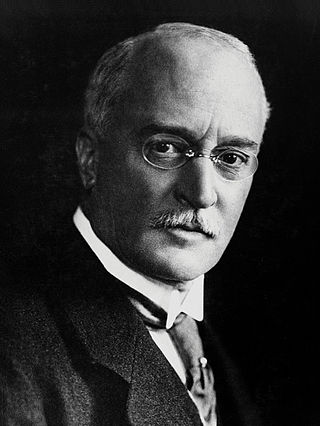
Rudolf Christian Karl Diesel was a German inventor and mechanical engineer who is famous for having invented the Diesel engine, which burns Diesel fuel; both are named after him.
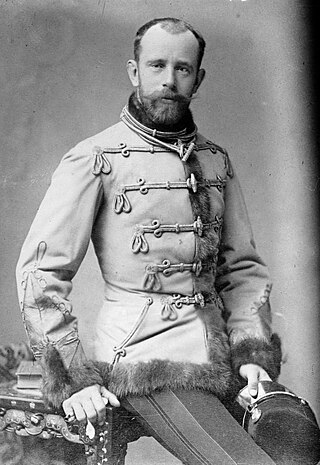
Rudolf, Crown Prince of Austria was the only son and third child of Emperor Franz Joseph I of Austria and Duchess Elisabeth of Bavaria (Sisi). He was heir apparent to the imperial throne of the Austro-Hungarian Empire from birth. In 1889, he died in a suicide pact with his mistress Mary Vetsera at the Mayerling hunting lodge. The ensuing scandal made international headlines.

Christa Ludwig was a German mezzo-soprano and sometime dramatic soprano, distinguished for her performances of opera, lieder, oratorio, and other major religious works like masses, passions, and solos in symphonic literature. Her performing career spanned almost half a century, from the late 1940s until the early 1990s.

Dame Susan Jocelyn Bell Burnell is an astrophysicist from Northern Ireland who, as a postgraduate student, discovered the first radio pulsars in 1967. The discovery eventually earned the Nobel Prize in Physics in 1974; however, she was not one of the prize's recipients.
Gundula Janowitz is an Austrian lyric soprano singer of operas, oratorios, lieder, and concerts. She is one of the most renowned opera singers of the 20th century and was pre-eminent in the 1960s and 1970s.

Susan Solomon is an American atmospheric chemist, working for most of her career at the National Oceanic and Atmospheric Administration (NOAA). In 2011, Solomon joined the faculty at the Massachusetts Institute of Technology, where she serves as the Ellen Swallow Richards Professor of Atmospheric Chemistry & Climate Science. Solomon, with her colleagues, was the first to propose the chlorofluorocarbon free radical reaction mechanism that is the cause of the Antarctic ozone hole. Her most recent book, Solvable: how we healed the earth, and how we can do it again (2024) focuses on solutions to current problems, as do books by data scientist Hannah Ritchie, marine biologist, Ayana Elizabeth Johnson and climate scientist Katharine Hayhoe.

Karl August Folkers was an American biochemist who made major contributions to the isolation and identification of bioactive natural products.
The Storz Brewing Company was located at 1807 North 16th Street in North Omaha, Nebraska. Established from a company started in 1863, Storz Brewing began in 1876 by Gottlieb Storz and was owned by the Storz family until 1966; the brewery ceased operations in 1972. Their beers won several prizes in international competitions, and Storz was the top selling brand in Nebraska starting in World War II. Storz was one of the "Big 4" brewers located in Omaha, which also included the Krug, Willow Springs and Metz breweries. On August 8, 2013, it was announced the brand would be revived by Tom Markel, nephew of Monnie Storz Markel, the granddaughter of Gottlieb Storz, with his cousin John Markel, son of Monnie Storz Markel as investor.
The Rudolf-Diesel-Medaille is an award by the German Institute for Inventions in memory of Rudolf Diesel for inventions and the entrepreneurial and economical implications accounting to the laureate. Since 1953 the award has been presented yearly until 1969 and then irregularly every two or three years.

Deepika Kumari is an Indian professional archer. She won a gold medal at the 2010 Commonwealth Games in the women's individual recurve event. She also won a gold there in the women's team recurve event with Dola Banerjee and Bombayala Devi. She won individual gold in two of the three stages of the World Cup—one in Guatemala and another in Paris. In the process she also reclaimed the number one ranking after nine years at the Paris World Cup. Deepika won individual gold medals at the Archery World Cup Stage 1. She defeated Mexico by 5–1 in the final to win the gold in Paris.
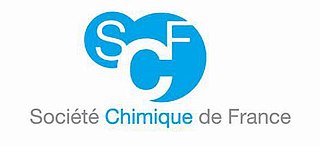
The Société Chimique de France (SCF) is a learned society and professional association founded in 1857 to represent the interests of French chemists in a variety of ways in local, national and international contexts. Until 2009 the organization was known as the Société Française de Chimie.
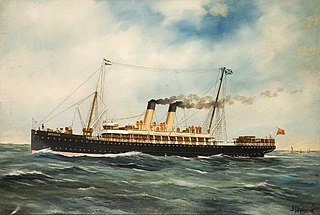
SS Dresden was a British passenger ship which operated, as such, from 1897 to 1915. She is known as the place of the 1913 disappearance of German engineer Rudolf Diesel, inventor of the diesel engine. The ship was built in 1897 by the Earle Company at Hull for the Great Eastern Railway. She operated on the North Sea route between Harwich and the Hook of Holland. She was renamed HMS Louvain in 1915 and was used by the Royal Navy in World War I. until her loss in 1918.
Julius Meimberg was a German Luftwaffe military aviator during World War II, a fighter ace credited with 53 aerial victories—that is, 53 aerial combat encounters resulting in the destruction of the enemy aircraft—claimed in over 250 combat missions. In the 1960s, he invented an open-end spinning device and received patents in the US and Germany for it. In 1970, Meimberg founded the travel agency "Meimberg" and in 2001, he received the Rudolf-Diesel-Medaille for his achievements as an inventor.
The Konrad Zuse Medal for Services to Computer Science is the highest award of the Gesellschaft für Informatik, given every two years to one or sometimes two leading German computer scientists. It is named after German computer pioneer Konrad Zuse. Note that a different medal with the same name is also given out by the Zentralverband des Deutschen Baugewerbes.
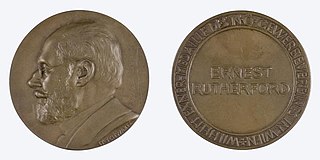
The Wilhelm Exner Medal has been awarded by the Austrian Industry Association, Österreichischer Gewerbeverein (ÖGV), for excellence in research and science since 1921.
Ulrike Beisiegel is a German biochemist and university professor who in 2011 became the first woman to serve as president of the University of Göttingen, founded in 1737. Her research on liver fats and disease was honored with the Heinz Maier-Leibnitz Prize, the Rudolf Schönheimer Medal and an honorary doctorate. Intent on maintaining high levels of scholarship and diminishing scientific misconduct, she has served on many boards and committees, receiving the Ubbo-Emmius Medal for her commitment to good scientific practice and an honorary doctorate from the University of Edinburgh.

Katharina Habsburg-Lothringen-Kyburg, known professionally by her stage name Tita von Hardenberg, is a German noblewoman, television journalist, presenter and producer.
Karl Storz SE & Co. KG is a German medical device company that manufactures and sells endoscopes and surgical instruments. It was founded in Tuttlingen by Dr. Karl Storz in 1945. The company is privately owned; Storz' daughter, Sybill, took over running the company after Storz died in 1996.